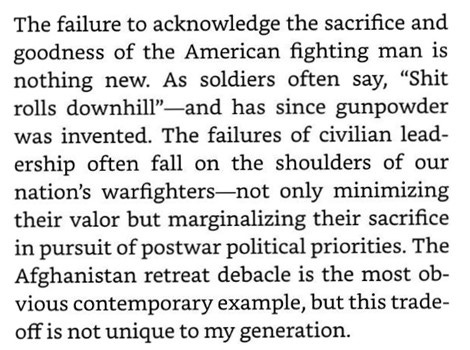Hegseth Should be Confirmed
Opposition to Hegseth as SECDEF is driven by the desire to hamstring Trump.
There is a concerted and coordinated campaign to hamstring President Trump by either destroying or severely wounding some of his senior advisors and key cabinet nominees, including Elon Musk, Tulsi Gabbert, Kash Patel, Robert F. Kennedy, Jr., Matt Gaetz, and Pete Hegseth.
Let’s take a look at the campaign against Pete Hegseth.
The statutory requirement for Secretary of Defense
The only explicit personal requirements for Secretary of Defense are set out in 10 U.S.C. §113. They are:
To ensure civilian control of the Department of Defense, as head of the Department the Secretary must be “appointed from civilian life by the President;” and
For the same reason, a retired general or admiral (pay grades O-7 and above) from “a regular component of an armed force” may not be appointed as Secretary within 10 years of their last active duty. For officers below the 0-7 grade (colonels and Navy captains and below) the limitation is 7 years.
Hegseth unquestionably satisfies those scant statutory requirements. But the press, many (most?) Democrats and a smattering of Republicans have raised questions about Hegseth’s fitness to serve. Their line of attack is marked by two principal arguments: (1) Hegseth's lack of experience in leading or managing a large business or enterprise, and (2) anonymous allegations that he is guilty of sexual improprieties. Any serious analysis of the allegations reveals that they do not justify voting down President-elect Trump’s selection of him.
Experience
Hegseths’ lack of experience in leading or managing a large enterprise is the principal substantive allegation raised to oppose his nomination. That argument may have a superficial appeal to some, but any close examination refutes it.
First, in considering this argument remember this — none of the senators who have expressed reservations or opposition to Hegseth had any compunctions about voting to confirm Lloyd Austin. Only two Senators voted against this guy’s confirmation as SECDEF, Josh Hawley (R-MO) and Mike Lee (R-UT).
Austin had a resume chock-full of experience. He had commanded, among other things, an Army division, corps and field army. He retired as a 4-star general. “Qualified?” Heck yes. On paper.
Despite that experience, Austin has been a calamitous Secretary of Defense. He presided over the disastrous retreat from Afghanistan. He has held no subordinate commanders responsible for that debacle. No accountability; not a single person lost their job over it. He demonstrated his gross lack of judgment when he was famously AWOL from his post, secretly checking himself in to Walter Reed Hospital for cancer surgery without bothering to keep his boss, the President, informed. He has encouraged “Woke” political policies throughout the armed forces — transgenders in the military, women in infantry combat, requiring every person in the military to submit to the COVID jabs with general discharges for those who did not comply, admitted racial discrimination in officer assignments and promotions as well as in recruiting and admissions to the Service Academies. His priorities include treating “climate change” as a national security threat on par with Communist China. He has politicized the Service Academies, which have been among the crown jewels in our higher educational system. He began by purging highly respected members of their Boards of Visitors so that he could substitute his own hand-picked candidates. Under his leadership, cadets at West Point, whom General MacArthur charged with the duty “to win our wars,” now must attend a mandatory seminar that “covers the structures of white power and [the] extent of white rage,” and they can minor in DEI studies.
So, Austin’s vast experience did not mean that he would be a competent SECDEF. In view of the history and performance of this “highly qualified” SECDEF, I cannot conclude that Pete Hegseth’s lack of similar experience is reason to oppose him.
What is most needed now is someone who can identify the rot that has infected our armed forces and root it out. Hegseth’s writings and public statements show that he is the man for the job. These excepts from his book, “The War on Warriors” shed light on that.
More from his book:
"We need to clean house of woke generals. Currently the Department of Defense has forty-four four-star generals with a total force of 1.2 million serving. In World War II, there were only seven four-star generals and over 21 million were serving. It's upside down, and ripe for firings—without replacements."
"Every unit recognizes that social justice, transgender issues, and woke training take precedence."
"Worst of all, military leaders who go along with the leftist social experiments—get promoted. It's been that way since Obama and is on hyper-speed today.
Military personnel who are able to speak1 will confirm these concerns and must-fix problems. In today’s political environment it takes courage to say these things. Hegseth has that courage. He knows what needs to be fixed and he has the moral courage to do it. His purported lack of experience managing large organizations does not trump those qualifications.
Anonymous allegations of sexual improprieties
Some of Hegseth and Trump’s enemies are putting great stock in anonymous allegations against him involving alleged sexual abuse and improprieties. I will make two brief points to show why allegations should not be considered.
Anonymous allegations are unreliable, unfair, and should be disregarded.
The allegations of sexual improprieties by Hegseth are by anonymous accusers. Anonymous allegations, by their very nature, are unreliable and typically are not admissible in legal proceedings. That is because the story told by an anonymous accuser cannot be tested by cross-examination, which the Supreme Court has described as the “greatest legal engine ever invented for the discovery of truth.” For that reason, it “is an essential and fundamental requirement for the kind of fair trial which is this country’s constitutional goal.”
Although Senate confirmation proceedings are not courtroom trials, it is useful to consider how such allegations would be treated in a court of law. If courts routinely exclude such allegations as unreliable, should the U.S. Senate adhere to a lower standard and deny confirmation of a cabinet officer?
Some might argue that one of the allegations were made by a woman who filed a police report and therefor was not anonymous, at least to the police. That should not change the result for two reasons. First, the accuser is still anonymous to all Senators and the general public and unless things change, this unknown person will not testify and be subject to cross-examination. Second, the police investigated her complaint and declined to file charges. That should tell us something about their reliability.
In discharging their weighty Constitutional duties, U.S. Senators should give zero weight to the anonymous allegations targeting Hegseth.
Hypocrisy be thy name.
Two words: Bill Clinton. [Some of] his sexual assaults and abuses are well-known. There is no need to rehash them here. What is notable is that zero Democrats thought that his sexual abuses should disqualify him from holding office. Bill Clinton’s defender-in-chief labeled the accusations against him as part of a “vast right-wing conspiracy.” When Hillary then ran against Trump in 2016, no Democrat thought that she should be disqualified because she defended an accused sexual predator. See the video here (beginning at 11:47).
Now consider the record of just one of the female senators who has been identified as someone whose support for Hegseth is in doubt. The longest-serving Republican woman senator is Susan Collins who so far has been playing it close to the vest. When asked about the allegations against Hegseth, she says that she has “a lot of questions” and that “obviously I am concerned about the allegations against him and his treatment of women.”
When considering Senator Collins’ ultimate position, it is fair to ask what her position on allegations of sexual misconduct has been and whether they should disqualify a man from high national office. Her track record gives the answer to that. She has explained why she did not vote to convict and remove President Clinton from office after he was impeached: “I voted to acquit President Clinton, even though the House Managers proved to my satisfaction that he did commit a crime….”
What crime? The First Article of Impeachment to which Collins was referring charged this:
On August 17, 1998, William Jefferson Clinton swore to tell the truth, the whole truth, and nothing but the truth before a Federal grand jury of the United States. Contrary to that oath, William Jefferson Clinton willfully provided perjurious, false and misleading testimony to the grand jury concerning one or more of the following: (1) the nature and details of his relationship with a subordinate Government employee; (2) prior perjurious, false and misleading testimony he gave in a Federal civil rights action brought against him; (3) prior false and misleading statements he allowed his attorney to make to a Federal judge in that civil rights action; and (4) his corrupt efforts to influence the testimony of witnesses and to impede the discovery of evidence in that civil rights action.
Article II included this:
On December 23, 1997, William Jefferson Clinton, in sworn answers to written questions asked as part of a Federal civil rights action brought against him, willfully provided perjurious, false and misleading testimony in response to questions deemed relevant by a Federal judge concerning conduct and proposed conduct with subordinate employees.
Thus, the crimes that were proven to Collins’ satisfaction included Clinton’s perjury when he denied having had sexual relations with a 22-year-old White House intern, and his perjurious testimony in another case brought by an Arkansas state employee who accused him of exposing himself and making other improper advances while he was Governor.
So, although it was proven to Collins’ satisfaction that Clinton had engaged in these instances of sexual misconduct, she did not believe that they warranted his removal from office. She had a lot of company in that judgment.
There are obvious differences between removing an office holder via impeachment and refusing to confirm a nominee for a cabinet position. But I note that in Clinton’s case, the allegations were not anonymous and had been tested by rigorous cross-examination. But the common thread is that both instances require making a judgment as to whether the office holder or nominee should hold a high federal office. Collins’ history shows that her judgment is that lying about such charges, which obviously can only be proven if the underlying charges of sexual abuse are valid, do not disqualify the perpetrator from holding office, even a high office.
Pete Hegseth should be confirmed.
Many active-duty personnel are properly reluctant to comment on political issues or to publicly take issue with their commanders, unless required to do so.









Another great article, John, and timely. The entrenched generals think they ARE the Defense Department. We do need to see most of them retire on their own, or be retired. We need new blood, someone like Hegseth who can draw into the military Millennials and Gen Zers. HIs vitality and his strengths remind me of Oliver North. He would do well to watch how North handled congress when we was question. He put an ass kicking on them they never forgot.
". . . gross lack of judgement . . . ". Love it.